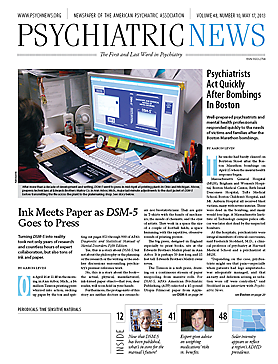It has been commonly believed that prolonged solitary confinement in prison is psychologically damaging, especially for inmates who were mentally ill before being assigned to this type of punishment.
Now a “carefully performed study calls those beliefs into question,” Paul Appelbaum, M.D., the Dollard Professor of Psychiatry, Medicine, and Law at Columbia University College of Physicians and Surgeons and a past APA president, told Psychiatric News. “The intuition that many people have that, ‘If they ever put me in solitary, I’d go crazy,’ just doesn’t reflect what actually occurs.”
The new study was conducted by Jeffrey Metzner, M.D., a clinical professor of psychiatry at the University of Colorado, and colleagues. The results were published in the March Journal of the American Academy of Psychiatry and the Law.
The researchers assessed 270 Colorado prison inmates charged with violating prison rules and who, after a disciplinary hearing, were placed in one of three prison environments. Subjects in the first group, which included individuals with or without a mental illness, were placed in a super-maximum security environment in which they were locked in their cell 23 hours a day. Inmates in the second group, which also included individuals with or without a mental illness, were assigned to a general-population maximum-security housing unit, where they had more out-of-cell time per day than the first group had.
Those in the third group, which included only inmates with a mental illness, were placed in a special housing unit that offered intense mental health treatment.
The researchers then evaluated all the subjects with the Brief Symptom Inventory, a self-report measure that is widely used to assess a broad range of psychological symptoms and has shown reliability across forensic populations. The higher the score, the more psychopathology a person has.
At the end of one year, the researchers again had subjects complete the Brief Symptom Inventory and compared the scores with those from the initial assessment.
Mental Deterioration Not Common
Whereas some of the inmates’ psychological health deteriorated over the course of the study, this was generally not the case, even among inmates in solitary confinement. “We were surprised that only a small number of inmates in segregation got clinically worse,” Metzner told Psychiatric News.
So what could explain these surprising results?
“Administrative segregation may not be pleasant, but based on these data, it appears that prisoners—even prisoners with mental illness—find ways of adapting that mitigate negative consequences,” said Appelbaum.
Kelli Klebe, Ph.D., an associate professor of psychology at the University of Colorado and one of the study authors, expressed a similar opinion to Psychiatric News:
“All subjects were included in the study when in the midst of a crisis, and with time, the crisis dissipated, and they adapted to their environment. Since the pattern of change was similar for all groups, those receiving and not receiving treatment, or those receiving different types of treatment, I do not think it was a treatment effect.”
Some May Find Safety in Solitary
“Many people have a preconception of what correctional environments are, particularly for those with serious mental illness,” Robert Trestman, M.D., Ph.D., a professor of psychiatry at the University of Connecticut and executive director of Correctional Managed Health Care, said during an interview. “There are some people, particularly those with psychotic disorders or personality disorders, who are very suspicious and who want to feel safe. So in spite of the many movies and television series you hear about, for many folks, correctional environments can be safer than their real-life experiences in the world. Their anxiety is reduced, and their safety is increased. And many psychiatric symptoms are going to be minimized.”
“So as bizarre as that sounds,” he continued, “that is why all of these populations in general tend to do well. And even for those inmates who were not mentally ill, simply being in a structured environment helped them get better. Also keep in mind that while drugs of abuse are never completely eliminated in correctional environments, their availability is dramatically reduced. And co-occurring substance abuse, a major problem for many people with serious mental illness, is reduced, if not eliminated.”
What are the implications of these findings for those making decisions about the effects of solitary confinement?
Even though most of the inmates in solitary confinement did not get worse psychologically, most did not get better, Metzner pointed out. “This study supports the need for adequate, which likely means enhanced, mental health services for mentally ill inmates housed in long-term segregation units.” Also, “this study should not be generalized to other segregation units in other prison systems unless the conditions of confinement are very similar. For example, most inmates in segregation in this study had in-cell TVs, which often is not available in other prison segregation units.”
“And to take the study implications a step further,” Trestman asserted, “most people with serious mental illness do not belong in jail or prison because the vast majority are incarcerated for crimes that are not violent and would be far better treated and cared for in the community.” ■

